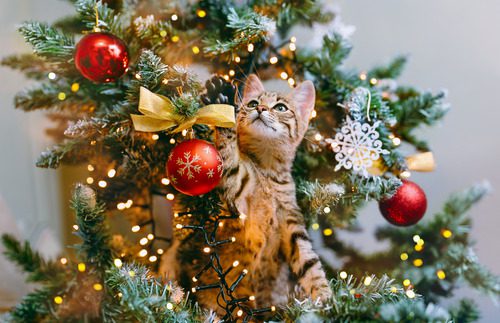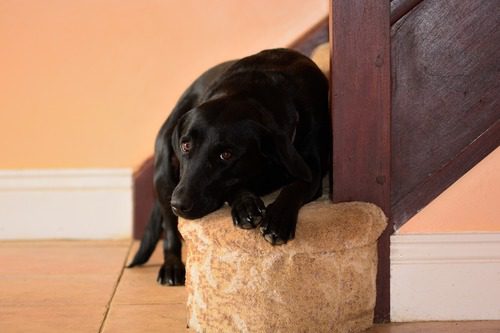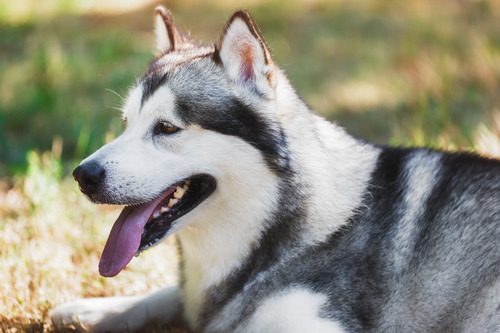Why Do Cats Like Christmas Trees?
Christmas is a magical time of year filled with twinkling lights, festive decorations, and the iconic Christmas tree. However, for cat owners, this season might bring a unique challenge: keeping their curious feline friends away from the tree. You might wonder, “Why do cats like Christmas trees?” In this blog, we’ll discuss the natural instinct of cats, potential reasons cats are attracted to Christmas trees, and how to keep your feline friend safe this holiday season.

The Natural Instincts of Cats
Cats are naturally curious creatures, driven by instincts that have been honed over thousands of years. Their fascination with Christmas trees stems from several of these innate behaviors. In the wild, climbing helps cats hunt, escape predators, and survey their territory. A Christmas tree, with its many branches and shiny ornaments, presents an irresistible climbing challenge.
Additionally, cats are attracted to movement and shiny objects. The twinkling lights and dangling ornaments mimic the appearance of prey, sparking a cat’s hunting instincts. This combination of climbing opportunities and stimulating decorations makes a Christmas tree a veritable playground for your cat.
Your Cat’s Attraction to Scents and Sounds
The scent of a real tree, with its pine needles and sap, can be particularly intriguing. Even artificial trees can have interesting smells from the storage area or household scents absorbed over time. The rustle of branches, the jingling of ornaments, and the crinkling of presents all attract a cat’s attention. These sounds can stimulate a cat’s natural curiosity and hunting instincts, encouraging them to explore further.
How Scents Affect Cats
Cats have an incredibly keen sense of smell, which they use to navigate their environment and communicate. The new and unfamiliar scent of a Christmas tree can be intriguing and slightly overwhelming, prompting cats to investigate. This curiosity can lead them to climb the tree or bat at ornaments, trying to understand this new addition to their home.
The Role of Play and Exploration
A Christmas tree offers numerous opportunities for cats to play, from batting at ornaments to climbing branches. For many cats, the tree is a new environment to explore, filled with novel objects and scents.
Keeping Your Cat Engaged
To help redirect your cat’s attention from the tree, provide plenty of alternative toys and activities. Interactive toys, scratching posts, and puzzle feeders can keep your cat entertained and reduce their interest in the tree. Ensuring your cat has enough mental and physical stimulation can help minimize their desire to climb or play with the tree.
Safety Concerns for Cats at Christmas
While it’s fun to watch your cat enjoy the holiday season, consider their safety as well. Christmas trees pose several risks to cats, from ingesting tinsel and small ornaments to the potential for tree-related injuries. Here are some tips to secure your Christmas tree and keep your cat safe:
- To prevent accidents, make sure your tree is stable and secure.
- Use a sturdy tree stand and, if possible, anchor the tree to the wall to prevent it from toppling over.
- Avoid placing fragile or small ornaments near the bottom of the tree where your cat can reach them. Instead, opt for larger, less tempting decorations.
Creating a Cat-Safe Holiday Environment
Consider using cat-friendly decorations, such as larger, unbreakable ornaments and avoiding tinsel, which can be hazardous if ingested. Additionally, you can create a designated play area for your cat, away from the tree, to keep them entertained and less focused on the decorations.
Using Cat Deterrents
Citrus scents are often unappealing to cats and can be used around the base of the tree. Commercial sprays designed to deter cats can also be effective. However, always ensure these products are safe for use around pets.
Now that you understand the possible reasons why cats are drawn to Christmas trees, you can help to create a safer, more enjoyable holiday season for everyone. If you have concerns about your cat’s behavior or health during the holidays, it’s always a good idea to consult with your veterinarian. For more tips and advice, or if you need to schedule an appointment, call Cornerstone Veterinary Hospital of Clifton Park at (518) 383-6254.
Recent Posts
Recognizing and Managing Arthritis in Senior Pets
Recognizing and Managing Arthritis in Senior Pets As our pets age, they often face challenges that mirror…
Importance of Regular Cat & Dog Vaccines
Importance of Regular Cat & Dog Vaccines Ensuring the health and longevity of our pets is a…
Dog Heatstroke: How to Keep Your Dog Safe in the Summer Months
Dog Heatstroke: How to Keep Your Dog Safe in the Summer Months As the summer season rolls…
About Us
Originally opened as Animal Care Hospital by Dr. Mark Johnston in 1989, the hospital became Cornerstone Veterinary Hospital in 2015 when it was purchased by Drs. Alan and Lisa Knott. The name 'Cornerstone' holds a special place in their hearts, representing not only their Christian faith but also their commitment to being the cornerstone of the community in which they practice. As a family-owned and operated practice, every pet is treated as part of the family, ensuring they receive the highest standard of care. The team at Cornerstone Veterinary Hospital is dedicated to building lasting relationships with clients and their beloved pets, striving to be the cornerstone of the community in which they practice.



